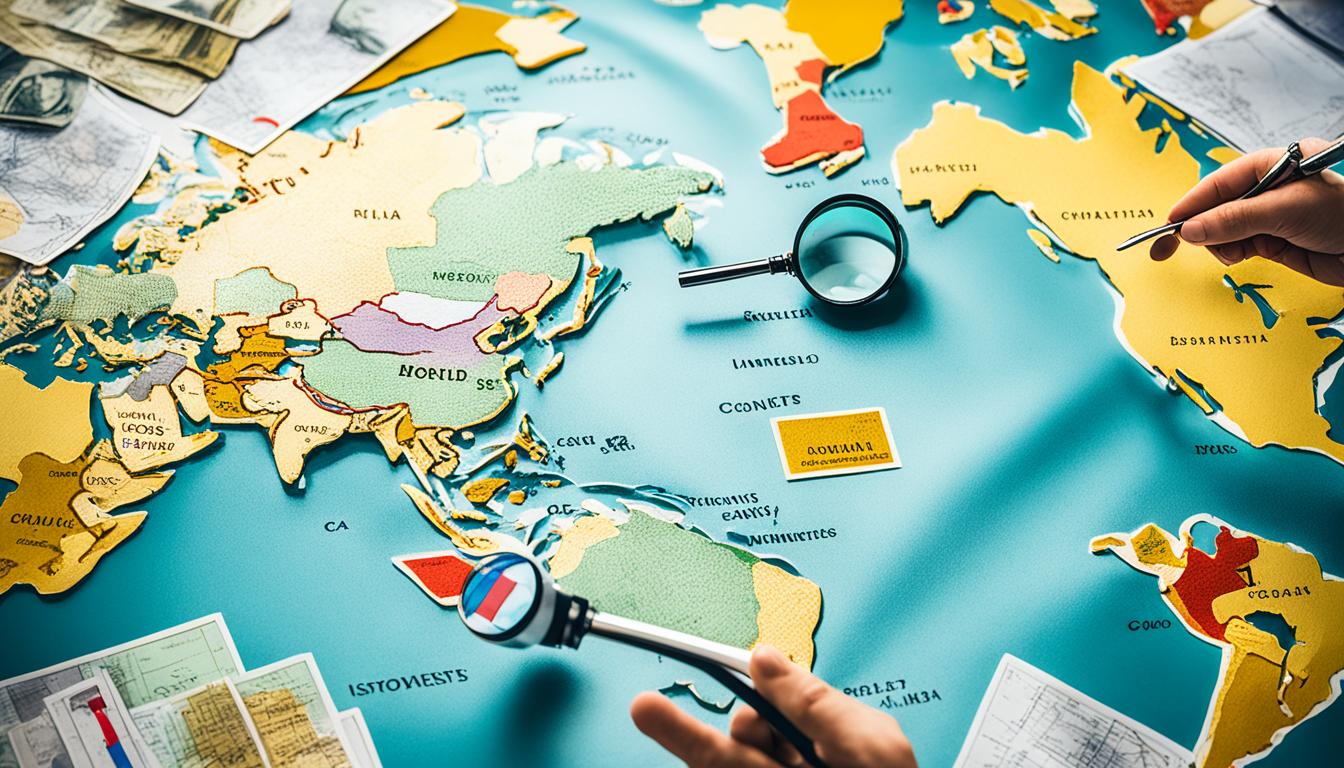Offshore banking accounts are a safe and flexible choice for those wanting global banking. They bring several perks like handling money internationally easily, possible tax breaks, and better savings rates. By looking into offshore banking, you can enter the worldwide financial scene and find new chances.
Picking the right place for offshore banking is key. You need to think about economic and political steadiness, how easy it is to open an account from afar, online banking, data privacy laws, and banking credibility. When you consider these things carefully, you can choose a location that matches your money plans and values.
Key Takeaways:
- Offshore banking accounts provide secure and flexible international banking options.
- Benefits of offshore banking include easier international financial management, potential tax advantages, and higher interest rates.
- Choosing the right destination involves considering economic and political stability, remote account opening capabilities, internet banking facilities, privacy laws, and financial institution reputation.
- Offshore banking allows individuals and businesses to tap into the global economy and access a range of financial opportunities.
- By carefully assessing key factors, you can make an informed decision and enjoy the advantages of offshore banking.
The Top 6 Countries for Opening Offshore Accounts
When it comes to offshore accounts, some countries shine for their strong banking systems and friendly rules. These top six countries are great for offshore banking:
- Switzerland: It’s known for its tough laws on privacy and its steady economy. Swiss banks are famous for being private and they offer many services and options for both people and companies.
- Hong Kong: Being a major financial center, Hong Kong provides lots of financial products and services. Its economy is stable and its tax rules are good for those with offshore accounts. It also links well with international banking.
- Cayman Islands: Known for being a tax-friendly place, the Cayman Islands are popular for their easy tax rules and laws that protect assets. They have a strong banking system with many financial institutions.
- Germany: Famous for its economic stability, Germany has strong banks that are known for their good online services. Its use of the euro makes international finance easy from there.
- Belize: Belize is well-liked for its easy rules and English-speaking environment, making banking and safeguarding money simple. It also has low fees and a variety of financial services.
- Singapore: As a key financial hub, Singapore is respected for its secure and stable banking. It offers many currency options, modern technology, and strict financial rules, making it a top choice for safe offshore banking.
These countries are known for their strict privacy laws, financial stability, ease of multi-currency transactions, and solid banking. They’re good if you want to protect your assets, do business abroad, or diversify your financial portfolio. These perks make them stand out for offshore banking users.
If you’re not sure which country fits your offshore banking needs best, talking to a finance or legal expert who knows about offshore banking is wise. They can help you understand your options and choose what’s right for you, considering your financial goals and tolerance for risk.

What is an Offshore Bank Account?
An offshore bank account is set up in a country different from where the account holder lives. It gives people and companies an international banking option that’s safe and flexible. For many, it’s better than a local account because it comes with several benefits.
Some think you need to start an offshore company to get an offshore bank account. But this isn’t true for all cases. Both people and businesses can open them from anywhere. The steps are simple and don’t always involve starting a new offshore company.
Offshore bank accounts have many uses and benefits. For one, you can manage payments in different currencies easily. This is great for those doing business or living in more than one country. It means you don’t need several accounts for various currencies.
Also, these accounts can help lower taxes for businesses. Some offshore areas have tax rules that let people and companies legally lower their taxes. By using these accounts the right way, you can pay less in taxes and keep more of your money.
Having an account offshore can also protect your money and investments better. Offshore banks offer more privacy and security than local banks. Countries with offshore banks often have strict rules to keep your information and money safe from theft or risks.
“Opening an offshore bank account can offer individuals and companies a range of financial benefits and opportunities.”

Generally, offshore bank accounts let people and companies spread out their financial risks and find new opportunities. When you put your money in a trustworthy offshore place, you get to use their strong banking systems and good online banking. They also have laws that protect your privacy.
But, remember that offshore accounts have to follow certain tax and law rules. So, it’s smart to get advice from professionals in finance and law to make sure you’re doing everything right.
Next, we’re going to look at the benefits of offshore banking up close. We’ll see how they can help both people and companies reach their financial aims.
Benefits of Offshore Banking
Offshore banking gives you ways to grow your money wisely. It’s a good choice for people or businesses wanting to protect their wealth. It also opens doors to new, global investment chances.
Asset Protection
Keeping your money in different places helps keep it safe. If your home country faces trouble, your funds in other places are still secure. Offshore banks also keep your financial info private, protecting it from trouble.
Privacy and Confidentiality
Managing your money privately is important. Offshore banks follow strict rules to keep your financial secrets just that – secret. This is a big relief for those worried about their data being used wrongly.
Diversification of Assets
Diversification means spreading your money around to lower risks. With offshore banking, you can have assets in many places. This helps guard against losses from a single country’s economy or currency.

Access to International Investment Opportunities
Offshore banking lets you invest in different countries or markets. Some places are great for investing because of their tax benefits or strong markets. These investments can make your money work harder for you.
Tax Optimization
Using offshore banks can also mean paying less tax. Some places have lower taxes, which can help save money. But, it is key to follow the tax laws correctly to avoid trouble.
“Offshore banking provides benefits such as asset protection, privacy, diversification, access to international investment opportunities, and potential tax optimization.” – International Financial Advisor
Looking into offshore banking? Think about what you want to achieve with your money. It’s smart to talk to a financial expert. They can guide you through the offshore banking process and help you pick the best options for your finances.
Pros and Cons of Offshore Banking
Offshore banking can benefit both people and companies. Here’s a breakdown of the upsides:
- Asset protection: It safeguards your money from local legal issues and economic problems. This way, your assets stay secure no matter what happens.
- Privacy and confidentiality: Offshore banks tend to have stricter privacy laws. They keep your financial activities confidential. This is great if you value your privacy.
- Diversification: It lets you spread your investments across different countries. This lowers the risk of losing everything if one place has trouble. Plus, you can have accounts in various currencies to further spread your risk.
- Tax optimization: Some offshore places have tax laws that can lower what you owe. Legally, you might pay less in taxes. This means possibly more money in your pocket.
On the flip side, offshore banking also comes with its own set of issues:
- Higher costs: Services offshore can be more costly. You might face high setup fees, yearly bills, and charges for moving your money. It’s essential to crunch the numbers.
- Reduced transparency and regulation: Overseas, the rules might not be as strict. This means less oversight but also potentially more privacy. Yet, you must still make sure you follow the law to avoid trouble.
“Offshore banking has both pros and cons. It can shield your assets, offer secrecy, spread your investments, and help with taxes. But, be ready for the costs and the lack of clear rules.”
– Financial Expert
Before you jump into offshore banking, think about your money goals and the risks you’re willing to take. Getting advice from experts in this area can help you decide if it’s a smart move for you.

Choosing the Right Destination for Your Offshore Account
It’s important to pick the right place for your offshore account. Think about your financial goals and what you need. Many factors come into play for a good banking experience and the best benefits.
Economic and Political Conditions
Pick a place with stable economic and political conditions. Countries with strong economic growth, low inflation, and a stable government are ideal. These factors make for a good place to bank.
Remote Account Opening and Internet Banking Facilities
Offshore banking should be easy. Look for a place where you can open an account from afar. It’s also important to have internet banking that’s easy to use and secure.
Banking Infrastructure
A good banking system is important for offshore banking. Choose countries with modern banking technology and secure digital systems. This will make your transactions and account management smooth.
Privacy Laws
Keeping your financial and personal info safe is key. Look for places with strong privacy laws. This way, you can be sure your information is secure and private.
Multi-Currency Options
It’s great to have options for your money. Choose a place where you can use different currencies easily. This will make managing your international finances simpler.
Financial Institution Reputation
Go for banks with a solid reputation. Look for ones that are well-known for being stable and secure. Good customer service is also an important part of a bank’s reputation.
Minimum Deposits and International Transfer Fees
Don’t forget to check the costs of opening an account and transferring money. Make sure the fees match your financial plans. This can help you avoid unexpected costs.
Do your homework and think about these points. This will help you choose the best place for your offshore account. It’s wise to talk to financial advisors for help. They can guide you on legal and tax matters too.

Top Countries for Offshore Banking in 2024
Choosing the right offshore banking destination is key. In 2024, several countries are top picks for those wanting to open offshore accounts and use banking services there.
Hong Kong is a top choice this year. It has a strong financial system and offers good tax benefits. This makes it a safe and reliable place for international banking.
Switzerland is also among the best for offshore banking. It’s known for its strict privacy laws and financial safety. This attracts people and businesses wanting offshore accounts.
Belize is becoming a popular spot for offshore banking. It gives nice tax benefits and its financial sector is well-regulated. With a strong banking system and good investment chances, it’s a great pick.
Germany has a stable economy and strong banking. It offers many banking services and access to the European market. This makes it a great choice for offshore banking.
The Cayman Islands are well-known for offshore banking. They offer high financial privacy, good tax rules, and a developed financial industry.
Singapore is also at the top for offshore banking in 2024. It has strict rules, strong financial institutions, and many services. This makes it a secure place for offshore accounts.
Other top countries for offshore banking include Panama, the Republic of Seychelles, Nevis, and Georgia. Each has its unique benefits, like good tax advantages, financial stability, and solid banking systems.
Alliances Bank, a top offshore bank, offers great offshore banking services in these countries. They make sure clients have safe and efficient international banking options.
Image:
Conclusion
Offshore banking accounts are a safe way to manage funds internationally. They help both individuals and companies. With these accounts, you get many good things, like keeping your money safe, staying private, spreading out your money, getting services from banks around the world, and even paying less in taxes.
When you choose where to put your offshore account, think hard. Look at the economy and politics of the place. Also, see if you can open the account from far away and if they let you use the bank online. And don’t forget about the laws that protect your privacy and how trusted the bank is.
By looking closely at these things, you can decide well. You’ll then have a better handle on your financial future. Plus, you’ll be able to tap into what global banks can offer through offshore accounts.
FAQ
What are the benefits of offshore banking accounts?
Offshore banking accounts offer key advantages. These include protecting assets and maintaining privacy. They also provide opportunities for diversifying investments. Additionally, they may help in potentially reducing taxes.
What are the top 6 countries for opening offshore accounts?
The top 6 countries are Switzerland, Hong Kong, and the Cayman Islands. Also on the list are Germany and Belize, plus Singapore.
What is an offshore bank account?
An offshore bank account is set up in a foreign country. It’s done by people or companies not living there. Creating one may not always need setting up an offshore company.
What are the uses of offshore accounts?
These accounts have several uses. People use them to handle payments in various currencies. They can also help lower taxes for businesses.
Offshore accounts protect and grow wealth, while offering secrecy.
What are the pros and cons of offshore banking?
Offshore banking brings benefits like safeguarding assets and privacy. It also allows for more investment options and might reduce taxes.
However, it comes with downsides. These include higher costs and less regulation. In dealing with these accounts, one must also face complex compliance rules.
How do I choose the right destination for my offshore account?
Choosing where to open an offshore account involves several considerations. Look at a country’s economy and politics. Make sure they can open accounts without you being there.
Consider internet banking availability and the country’s banking laws. Also, think about currency options, the bank’s reputation, and its fees for international transfers.
What are the top countries for offshore banking in 2024?
The best countries for offshore banking in 2024 are expected to be Hong Kong and Switzerland. Others include Belize, Germany, and the Cayman Islands.
Singapore, Panama, the Republic of Seychelles, Nevis, and Georgia are also highlights.


